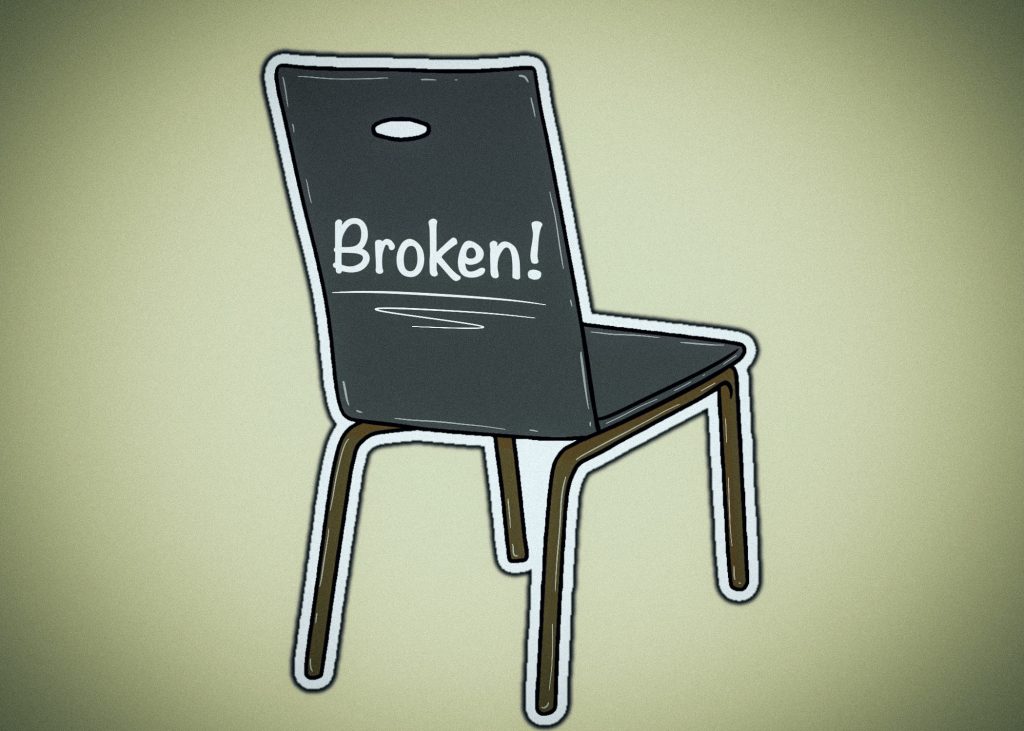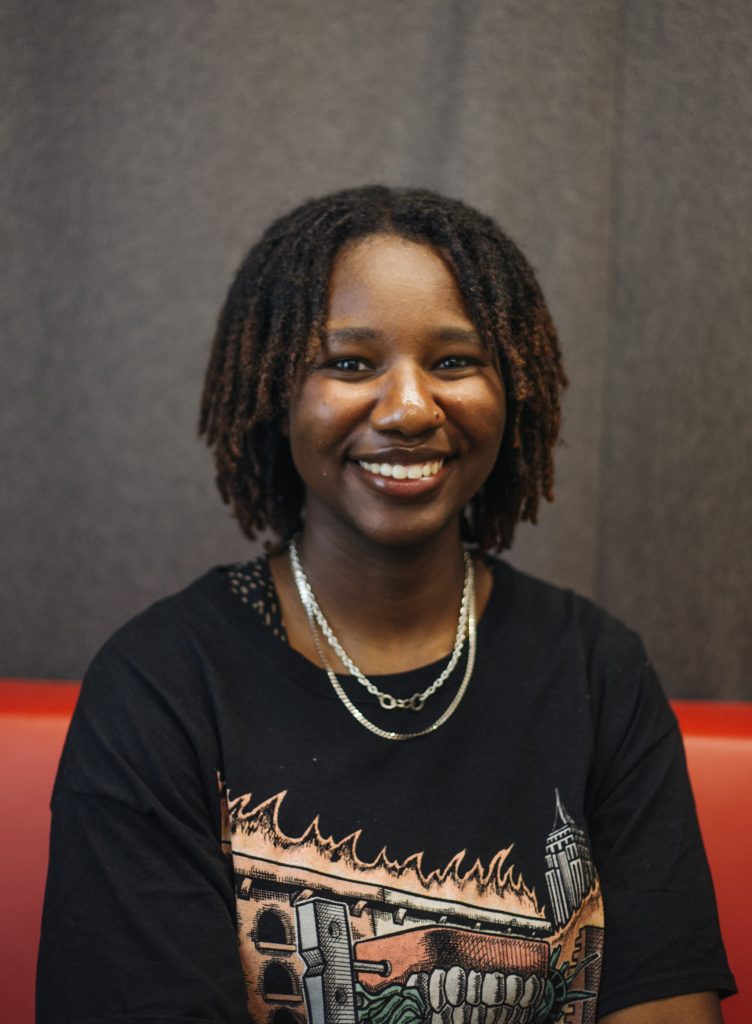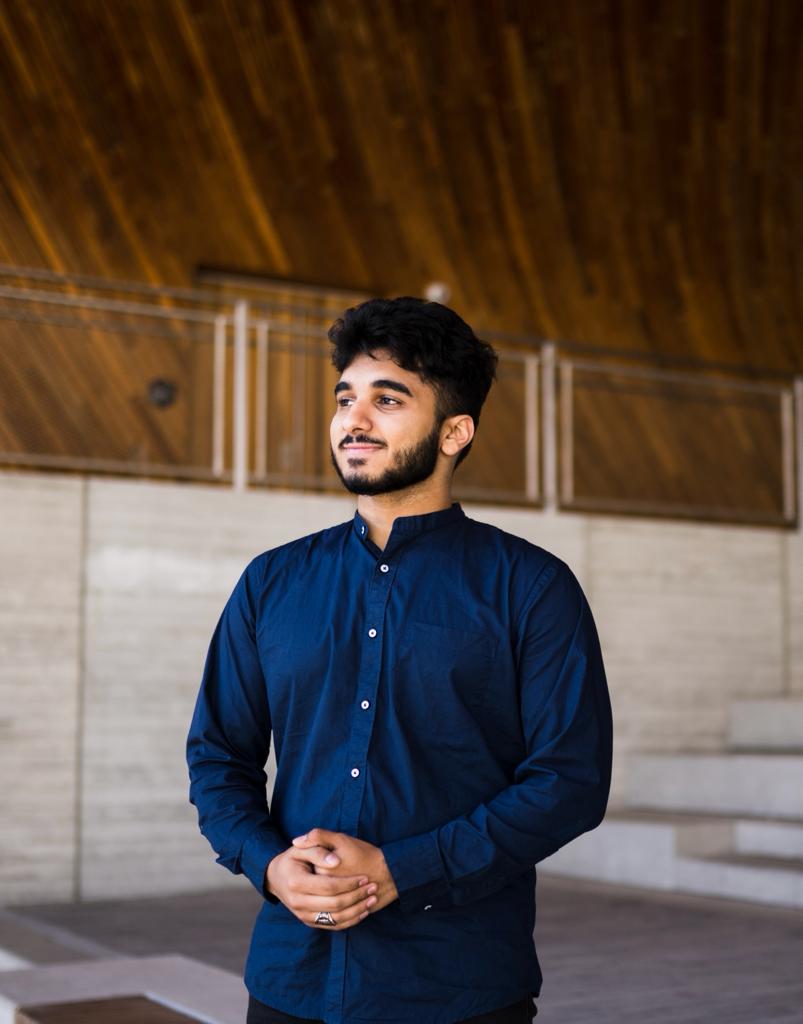SU By-Elections 2023: Faculty of Arts Representatives
By Nazeefa Ahmed, Ramiro Bustamante Torres, Eula Mengullo, Dianne Miranda, October 10 2023—
Along with the responsibilities outlined for all Students’ Legislative Council (SLC) members, faculty representatives are accountable for responsibilities particular to their role including: Reporting to students of their faculty the policies, positions and programs of the Students’ Union (SU), reporting to their faculty itself the policies, positions and programs of the SU, representing student constituents of their faculty at SLC, representing student constituents of their faculty on university committees and reporting to the VP Academic on matters of academic importance within their faculty.
This year, there are two Faculty of Arts Representative positions up for grabs. With five candidates running, Faculty of Arts students will have to narrow it down to their top two.
NAOMIE BAKANA

Naomie Bakana is a candidate for the Faculty of Arts representative position. Bakana did not interview with the Gauntlet, so this is what students can expect from her based solely on her platform.
There are three main points on Bakana’s platform: improving financial opportunities for students, supporting student development and promoting EDI.
For the first point, Bakana states she has already started work to offer scholarships for students facing financial difficulties using the SU Quality Money funding and hopes to promote more funding opportunities for arts students. On her second point, she states working with the Faculty of Arts Students’ Association (FASA) to create a committee that works to promote opportunities for research and funding to arts students, which overlaps with her first point.
She also hopes to promote work done by arts students in this committee which leads to her third point. Bakana states she will offer to join the EDI committee and police the SU by following the EDI values with their decisions.
While Bakana expresses the same sentiment of lack of opportunities for students, she offers very little difference from what her fellow candidates have on their platforms.
JONATHAN BARAZZUTTI

Jonathan Barazzutti is another candidate for the Faculty of Arts representative position. In an interview with the Gauntlet, he elaborated on his platform points consisting of tuition costs, budgetary autonomy and diversity and expression.
While Barazzutti recognizes that budget cuts play a significant part in the increased cost of education, he also maintains that the administration is not spending our money correctly. He wants to investigate how the university allocates resources by advocating for more budgetary transparency and introducing a sub-committee within the SU that will scrutinize the U of C’s budgetary decisions. For him, transparency is requisite for students to make informed decisions on where they would like to allocate certain amounts of funding.
“Once we get that information, we are in fact empowering students,” said Barazzutti.
He also mentioned that tuition hikes would not be so much a problem if, simultaneously, students had better access to mental health support, food bank infrastructure and housing on campus.
“If students had that then the increase in tuition is not inherently a problem, so if we are actually able to get the budget under control, cut spending where we consider it wasteful, then we can possibly advocate for ways which we can increase spending on things that students meaningfully care about on campus,” he said.
Elaborating on his point regarding freedom of expression, Barazzutti cited a 2019 statement from the university which protects freedom of expression on campus within the confines of Canadian law. However, as for the Students’ Union’s statement on freedom of expression released in February 2023 in response to the de-platforming of Frances Widdowson at the University of Lethbridge, Barazzutti thinks that this fundamentally inhibits freedom of expression on campus.
“I think that while they do have good intentions, my concern is that fundamentally, they are trying to stifle free expression on campus in a harmful way,” said Barazzutti.
“I do think that we need to ensure that as a Students’ Union, which is supposed to protect the students, that we should protect the most fundamental right that we have as Canadian citizens which is the right to free expression,” he continued.
“And this isn’t to support things that are hateful, those are already against Canadian law, it simply to say that students have a right to express controversial views and that the campus should be, at its core, a place for debates to occur.”
With regards to ensuring diversity of thought and culture in faculty hiring processes, Barazzutti provided a convoluted response but mentioned that he wants to extend the existing Equity, Diversity Inclusion and Accessibility program. Ultimately, he wants to emphasize cultural attachments as opposed to only using race as the sole determinant factor when it comes to hiring faculty members. However, he did not provide an explanation on how to exactly measure such cultural attachments.
“I think that we need to emphasize, as opposed to just looking at the person’s race, we should be looking at more of the cultural differences and cultural diversity,” he said.
Lastly, Barazzutti claims that he is the youngest person running in the race and sees this as a distinguishable benefit. He asserts that his ideas are aligned with the core values and missions of the university as an academic institution.
“At its core, what separates me from the other candidates is that I have significant ways for students to have more autonomy over their own academic institutions and enable students to assert themselves in ensuring that the U of C maintains the fundamental values of academia, which is the ability for us to discover new forms of knowledge, to uncover the truth and to progress ultimately.”
SHEROOG KUBUR

Sheroog Kubur, a third-year political science student with double minors in communications and French, is a candidate for the Faculty of Arts representative position. Based on her platform and her interview with the Gauntlet, this is what students can expect from her.
The biggest point in Kubur’s platform that trickles down into the rest is giving students a body to represent themselves and make themselves heard. Kubur wants to establish a direct line of access to departments, associations and clubs through general meetings.
“The logic behind this is coming from the idea that the Faculty of Arts is one of, if not, the largest faculties in the university and we do have a governing faculty specifically for the Faculty of Arts, however, something always gets lost in translation. You know you are trying to cater to all different kinds of students and you have the SU, which is in theory, a great mechanism, it is impossible to have four representatives who are typically running from very specific departments trying to represent the interests of every single student within the faculty,” she said.
The big issue within all the departments Kubur sheds light on, based on the SU’s faculty report, is academic advising.
“Students are often seeing classes that they need for their degrees get cut, or they have limited seats that aren’t available to students in their departments, or the classes are not being offered in a timely fashion, so students are needing to extend the duration of their degree, even though they in theory, wouldn’t really need to do that,” said Kubur.
Kubur wants to improve communication so that at the very least, students are given mechanisms to enable them to have input into which classes are being cut, how courses are structured, how many seats are being offered to majors versus non-majors, how many students will be enrolled into each class and which courses are wanted and made available. She hopes to open up the dialogue to figure out how faculty administration is making these decisions, put pressure on them to be transparent, and try to involve students in the consultation process as much as possible.
“Right now, that is not public information. This is not information students know even though this is information that very very much affects them and their degree paths,” said Kubur.
Another one of Kubur’s goals is to integrate the department representative position in FASA, department organizations and clubs.
“A big chunk of my platform is collaborating directly with FASA because I think that FASA is a much more effective representative body than trying to get four representatives in the SU to represent an entire body of students,” she said.
Kubur is confident in her understanding of the university, SU structures and the scope of the position. She knows the limitations of the role but is not afraid to push these limits which she believes makes her better suited to represent the students. Kubur believes that all that is in her platform is achievable and doable, especially within the academic year.
“I would much rather spend all of my time in this role trying to put power back into the hands of the students as opposed to trying to do these band-aid solutions to fundamental issues in the Faculty of Arts,” she said.
Kubur is currently the Director of Academic Advocacy within FASA. Even if she is not elected into this position, she would still like to have the opportunity to try and achieve these goals.
Disclosure: Kubur was a previous editor with the Gauntlet. All interview interactions — as well as the creation of this portion of the article — were handled by a staff member who never worked alongside Kubur.
MOHAMMAD ARHAAM MUKATI

Mohammad Arhaam Mukati is an arts student running for the Faculty of Arts representative position. Based on his platform and his interview with the Gauntlet, this is what students can expect from him.
Mukati had run for VP External in the SU’s 2023 General Election and lost the race. He mentioned that his reason to run for an Arts rep position this year is to shift his focus from issues that affect all students to working on the issues that arts students struggle with. He shared that his strong public speaking skills can be used to make sure that no student gets left behind if they are at a disadvantage.
“I think it’s unfair that I can take advantage of my connections in the department and other people can’t,” said Mukati. “That’s my biggest drive because seeing that it’s unfair and the solution to make it fair isn’t something crazy, but something very simple.”
Mukati wants to implement the Course Notification System where he explained a system or portal that would have a schedule for when courses would be offered beyond the shopping cart for future enrollment with a list of potential professors teaching the courses. He believes that by having such a system, students would be able to better plan their courses and be able to graduate sooner. When asked what tangible ways he had to implement the system, he shared that he plans on creating a petition to the university for the list to be released and would explain to the administration that it would benefit both students and the university.
“We’ll tell the university to put these lists, these tentative lists, notify their students [and] tell departments to tell professors to notify,” said Mukati.
Another point from Mukati is creating the Advising Liaison Initiative. When asked how this initiative differs from the current existing advising program or Arts peer mentorship program, he said that his initiative would bridge the gap between students and advisors through volunteers. He believes that the current advising system is a repetitive system that would stop students from receiving the help they need. The initiative would have volunteers create a log of students and each of the steps they have taken to avoid repetition. He said the volunteers would be eager to do their job as they create a connection between students and the advisors as their work would be incentivized by their position of responsibility. He did not mention whether these volunteers would need training or any form of certification.
“When you put that on a resume, when you tell employers about that, […] that holds a pedigree of responsibility and power and that automatically does things,” said Mukati. “It incentivizes the student liaisons and then it also helps advisors too.”
Mukati said that his experience and ability to voice the issues of others are what make him stand out in this race.
“I look at the SU as a platform, a great platform and it’s not just going to meetings and saying, ‘Hey, this is what the art student wants,’” he said. “[It’s] being able to actually voice their concerns in a manner that makes sense, common sense.”
TANNER NEIGEL
Tanner Neigel is a political science and communications student running for the Faculty of Arts representative position. In his interview with the Gauntlet, Neigel describes how his previous experience working with provincial leaders will help him pursue his platform goals.
“In order for us to move forward, we need to have a collaborative relationship with the provincial government to make sure the proper services are offered,” said Neigel. “I personally know some of the ministers which I believe would help in facilitating a really good and strong connection and relationship between the Students’ Union and the government.”
Neigel aims to freeze the University of Calgary’s Ahead of Tomorrow strategy until the student housing crisis is addressed. The university strategy hopes to increase undergraduate enrolment by 10,000 in the next seven years but does not state increasing on-campus housing in the strategy.
“I see it as unsustainable development. It’s going to put current students at much more of a disadvantage when it comes to finding housing in the future,” said Neigel. “A lot of students haven’t even heard of that plan and so a big reason why I’m running is to have more students know about the plan and know why it’s bad. Then, I’ll be able to have more success in advocating against it.”
Given that there isn’t a designated employment program for arts students, Neigel hopes to increase credit-based internships to increase career opportunities after graduation.
“I think that [work experience ] is something that’s lacking because too many art students with a lot of degrees don’t end up getting jobs after graduating,” said Neigel. “A big part of that is because the university has done a poor job in facilitating work opportunities which are connected with potentially course credits.”
Neigel also hopes to look deeper into how the university administration spends student funds.
“Too often when faced with budget cuts the university’s first reaction is to increase tuition on already struggling students. Our university is a massive organization employing countless people which means that before tuition increases are approved, we need to take a hard look at how the university administration uses our money,” reads a statement from his platform.
Additional platform points include looking into gas rebates for students driving to campus to support students beyond the UPass. Neigel also hopes to increase the programming during Bermuda Shorts Day (BSD) to make the event more memorable.
ZERNAB ZAFAR
Zernab Zafar is a political science, international relations, and French student running for the Faculty of Arts representative position. Based on her platform and her interview with the Gauntlet, here is what students can expect from her.
Zafar hopes to increase discussion around the UPass to see whether it is serving U of C students. Currently, all U of C pay per semester for the UPass whether they individually use transit or not.
“So if I was elected, I would go out and have more surveys and things like that to collect data on how the student body in general feels about the UPass. If I do get results, that enough people would like to opt out, I would fight for that just because I do feel that sometimes for people that drive to school, they do find it to be a bit of an inconvenience,” said Zafar. “On the other hand, if there is a larger amount of the population that supports keeping it and not having the opt out, I would advocate for that.”
Zafar hopes to increase flexibility for registering for courses so that arts students can look towards graduating on time. She states that arts students are currently uncertain about if they are going to get into the courses they need.
“My goal is to work collectively with the SU and the University to go through those kinds of courses so that more doors are opened and people aren’t limited as much so they can get out and start like after graduation as soon as possible,” said Zafar.
Zafar hopes to increase connections between clubs to increase community engagement within the faculty of arts. She hopes that the connections will create opportunities to bond outside of academia.
“Sometimes I don’t think clubs get the credit that they deserve for the importance they play in fostering community culture and bringing people together. I would start by having more open dialogue with the presidents and the executives of the clubs,” said Zafar. “It would help foster a bigger sense of community within the faculty of arts. We need support, and I think that the clubs are usually a place where that starts because it’s outside of academics.”
In her concluding remarks, Zafar states that her goal as a Faculty of Arts representative is to increase community and improve student experience.
“At the end of the day, my goal is to make everyone have a better experience at the university at the end of the day. I do consider myself fortunate to be a part of this community, but I also see myself fortunate to be in a position where I can progress it where it can help other people make it an even better experience.”
All undergraduate students in the Faculty of Arts can vote YES or NO on their ballot for up to two candidates for FACULTY REPRESENTATIVE or ABSTAIN from voting.
